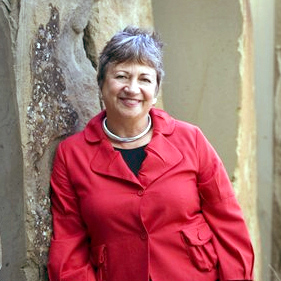In which Air Board chief Mary Nichols performs a dramatic reading of a vintage Jerry Brown speech

When its nascent cap-and-trade program ramps up later this year, California will be the first state in the nation to reduce greenhouse gases by making a broad spectrum of big polluters buy permits to exceed their allotted emissions.
Other governments, industry and scientists will be watching, but there’s still a lot to sort out. That much has been evident at this week’s carbon market and policy conference in San Francisco, “Navigating the American Carbon World.”
The long and winding road to carbon trading was highlighted by Mary Nichols, chair of the California Air Resources Board, in a little prank she played on the gathering. Obviously reading from a script, she stumbled over words, looked up at the audience, then back down at the page, plodding through her replies to moderator Diane Wittenberg.
“I see the clean air debate and the global warming debate as a great opportunity to deepen our commitment as a people to values that benefit us all and that benefits generations that follow,” Nichols said. Then she quoted Gregory Bateson, a British anthropologist who was married to Margaret Mead. Then she went on reading.
Eventually, Wittenberg interrupted, Nichols giggled, and they explained themselves: Nichols had gotten her hands on a speech Governor Jerry Brown had delivered in 1981. She said she was there at that speech, when Brown was supposed to talk specifically about the Clean Air Act, but went off on a tangent, speaking about global leadership instead.
“I wanted to take advantage of this opportunity which you have given me to insert some of these words here,” Nichols said, returning to her own persona. “Because I know that many people are always asking the question, and some of them ask me. Is the Governor really committed?”
Nichols says he is. But Brown has not been as proactive as his predecessor. Meanwhile, California’s emerging cap-and-trade program plan is still fraught with questions, not least of which is how to spend the revenue that the state expects to raise from the sales of pollution permits. At a hearing last month that was intended to hash out some of those details, the biggest news was that the first carbon permit auction would be delayed, pushed from August back to November.
[module align=”left” width=”half” type=”pull-quote”]”If I were in the utility business, I would be giving a lot of thought to what my business was going to look like.”[/module]
The conference is meant to help the academics, policy-makers and business people in attendance navigate the changing landscape of carbon markets. As California’s top air regulator, the job has fallen to Nichols to make carbon trading a reality. In her remarks to the carbon conference, she gave a nod to the complexities ahead.
“There’s a lot of uncertainties out there,” she told the audience of several hundred. “I don’t want to say I feel sorry for the oil companies, because they’re doing pretty well, thank you,” she said. “But I would say that, you know, if I were in the utility business, I would be giving a lot of thought to what my business was going to look like.”
Nichols also acknowledged that while there are real economic benefits to California being a leader, there’s no guarantee that other governments will follow its example. Currently no other state (in the U.S.) is. And on Capitol Hill, cap-and-trade is a non-starter.
“If by 2020 we don’t have a government in the United States — and I would say a government in Canada as well — that have stepped up to the plate and adopted some form of national commitment to reduction of greenhouse gases, and joined in some sort of an international program to accomplish this goal, then I would say our claims of leadership are not all that they were cracked up to be,” Nichols said.
California’s first carbon permit auction is scheduled for November, with a practice run in August.
2 thoughts on “California Braces for the Complex World of Carbon Markets”
Comments are closed.

Federal ethanol policy increases Government motors oil use and Big
oil profit.
It is reported that today California is using Brazil sugar cane
ethanol at $0.16 per gal ($8billion for Big oil) increase over using GMO corn
fuel ethanol. In this game the cars and
trucks get to pay and Big oil profits are the result, that may be ready for
change.
Folks that pay more at the
pump for less from Cars, trucks, food, water & air need better, it is time.
The car tax of AB 118 Nunez is just a simple Big oil welfare
program, AAA questioned the policy and some folks still agree.
AB 523 is just a short put (waiver) from better results.
This appears to operate like the pollution credits program which allows large scale polluters to continue polluting if they are willing to buy credits which of course government extracts its share. From what I can see this is just another government power grab that is built upon a house of cards. We now know that approximately 20 percent of California’s airborne contamination is emanating from Asia where real environmental problems exist. Any impact California might have on the environment is miniscule by comparison and the regulatory burden will likely force more business and tax revenue out of the state.